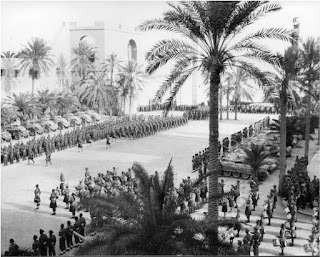Eighty years ago General Montgomery stages a triumph in Tripoli
The British 8th Army under General Montgomery overcame a token rearguard action by Rommel and took the Libyan capital city Tripoli. This marked the moment that the British advance westward reached far beyond the point hit by General Wavell's Compass assault on the Italians in 1941. Montgomery celebrated with a large victory parade through the city to mark the first major British land victory over the Axis of the war. It was a striking moment but the the Allies still faced strong resistance by the Germans in Tunisia; the North African campaign was far from over.
In the Pacific the Australians and Americans achieved a similarly striking but ultimately hollow triumph when Australian Papua on New Guinea was liberated from the Japanese in the final stage of the Buna-Gona campaign, the first defined territory conquered by the Japanese to be won back. The heavily fortified town of Sanananda was defended to the last by Japanese forces. Organized resistance was crushed but large numbers of scattered Japanese troops remained to be hunted down. The allied forces had suffered severe casualties in the campaign from combat and disease.
The UK-US summit at Anfa in Morocco produced no final ruling on who should lead the non-Vichy French. President Roosevelt never wavered in his dislike of General de Gaulle, even if the shortcomings of the preferred American candiadate, General Giraud, were all too obvious. Giraud and de Gaulle were brought together for the first time since the Battle of France; Roosevelt joked unconvincingly that they were bride and groom. In practice the French generals were left to fight it out between themselves.
German domestic propaganda adopted a notably new tone. In place of trumpeting the ever-less plausible story of Germany's pending triumph, Goebbel's machine was beginning to warn the German people of sacrifices ahead and the need to fight against a campaign of anihilation.
A Luftwaffe nuisance daytime raid on London achieved a grim success. No warning had been sounded, in part because the attacking aircraft were all fast single-seaters. A single bomb dropped by a FW190 hit Sandhurst Road School in Catford. 38 children and six teachers were killed. By some accounts the raid was a reprisal for the RAF's bombing of Berlin a few days before.



Comments
Post a Comment